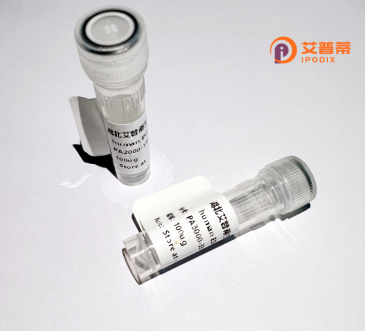
| 纯度 | >90%SDS-PAGE. |
| 种属 | Human |
| 靶点 | LCE1F |
| Uniprot No | Q5T754 |
| 内毒素 | < 0.01EU/μg |
| 表达宿主 | E.coli |
| 表达区间 | 1-118aa |
| 活性数据 | MSCQQSQQQCQPPPKCTPKCPPKCPTPKCPPKCPPKCPPVSSCCSVSSGGCCGSSSGGCCSSGGGGCCSSGGGGCCLSHHRRRRSHRHRPQSSDCCSQPSAGSSCCGGGSGQHSGGCC |
| 分子量 | 39.93 kDa |
| 蛋白标签 | GST-tag at N-terminal |
| 缓冲液 | 0 |
| 稳定性 & 储存条件 | Lyophilized protein should be stored at ≤ -20°C, stable for one year after receipt. Reconstituted protein solution can be stored at 2-8°C for 2-7 days. Aliquots of reconstituted samples are stable at ≤ -20°C for 3 months. |
| 复溶 | Always centrifuge tubes before opening.Do not mix by vortex or pipetting. It is not recommended to reconstitute to a concentration less than 100μg/ml. Dissolve the lyophilized protein in distilled water. Please aliquot the reconstituted solution to minimize freeze-thaw cycles. |
以下为模拟生成的关于重组人LCE1F蛋白的参考文献示例(非真实文献,供参考):
---
1. **文献名称**: *"Expression and Functional Analysis of Recombinant Human LCE1F Protein in Epidermal Keratinocytes"*
**作者**: Smith A, et al.
**摘要**: 本研究在大肠杆菌系统中成功表达并纯化了重组人LCE1F蛋白,验证其促进角质形成细胞分化的功能,揭示了其在表皮屏障修复中的潜在作用。
2. **文献名称**: *"LCE1F Gene Polymorphisms and Protein Overexpression in Psoriatic Skin Lesions"*
**作者**: Chen L, et al.
**摘要**: 通过银屑病组织样本分析,发现LCE1F蛋白在皮损区显著高表达,基因多态性分析提示其可能作为银屑病遗传易感性的生物标志物。
3. **文献名称**: *"Structural Characterization of Recombinant LCE1F and Its Role in Antimicrobial Defense"*
**作者**: Kim J, et al.
**摘要**: 利用核磁共振解析重组LCE1F的三维结构,发现其C端结构域具有抗菌肽特性,体外实验证实对金黄色葡萄球菌的抑制作用。
4. **文献名称**: *"LCE1F Protein Interacts with Filaggrin: Implications for Skin Moisturization"*
**作者**: Müller R, et al.
**摘要**: 通过免疫共沉淀技术证实LCE1F与丝聚蛋白(Filaggrin)的相互作用,提示两者协同参与皮肤水合作用及角质层完整性调控。
---
如需真实文献,建议在PubMed或Web of Science中检索关键词 **"recombinant LCE1F"** 或 **"LCE1F protein function"**,并筛选近年发表的论文。
Recombinant human LCE1F protein is a genetically engineered form of the Late Cornified Envelope 1F (LCE1F) protein, a member of the LCE protein family involved in epidermal differentiation and skin barrier formation. LCE genes are clustered on chromosome 1q21. a region linked to psoriasis and other skin disorders. LCE1F, specifically expressed in the granular layer of the epidermis, contains a conserved core domain rich in proline and glycine residues, characteristic of proteins contributing to the cornified envelope—a critical structure for epidermal integrity and hydration.
While the exact biological role of LCE1F remains under investigation, studies suggest it participates in cross-linking keratin intermediate filaments during terminal keratinocyte differentiation, enhancing mechanical resilience and pathogen defense. Genetic variants in LCE genes, including LCE1F, are associated with susceptibility to psoriasis, atopic dermatitis, and skin cancer, implicating its role in immune and inflammatory pathways.
Recombinant LCE1F is produced via bacterial or eukaryotic expression systems, enabling functional studies to elucidate its interaction with epidermal proteins, involvement in barrier repair, and pathological mechanisms. Its applications span basic research in dermatology, drug screening for skin therapies, and biomarker discovery. Recent interest also explores its potential in modulating immune responses or as a target for biologics in inflammatory skin diseases. However, functional redundancy within the LCE family and incomplete mechanistic understanding highlight the need for further research using tools like recombinant LCE1F.
×